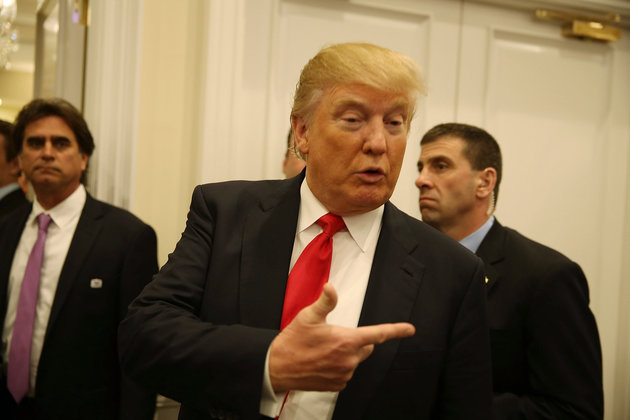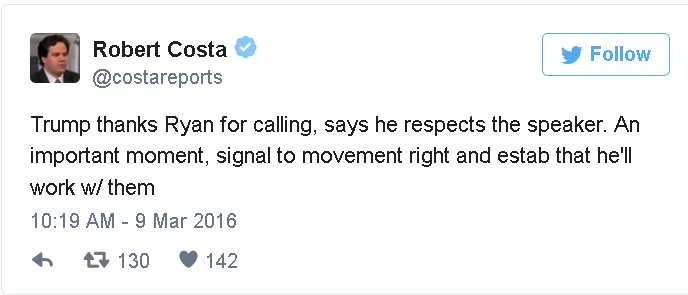
Donald Trump’s speech on Tuesday night, following big wins in the Michigan and Mississippi primaries, was among the strangest he’s made yet.
He talked about Trump steaks and Trump magazine. He bragged about the Jack Nicklaus-designed golf course at the Trump National Golf Course. And he saluted Paul O’Neill -- the former Yankee player, not the former treasury secretary.
But the most intriguing part of the speech was its most conventional one. Trump praised House Speaker Paul Ryan (R-Wis.), with whom he'd had a phone conversation earlier in the week. “He couldn’t have been nicer,” Trump said. “He was very encouraging.” He talked about unifying the party.
And then he called upon his supporters to rally behind Republican members of Congress. “It’s very very important as a Republican that our senators and our congressmen get re-elected, that we put a good group of people together, that we keep the people that are there,” Trump said. “If we are going to be effective, it’s very very important.”
It sounded an awful lot like an overture to the GOP establishment.
There's no way to be sure, because you can never take what Trump says at face value. He speaks before thinking. He changes his mind. He lies. He’s perfectly capable of calling somebody disgusting or worse -- and then, a few minutes later, praising that same person as a “good guy.” In fact, he did precisely that on Tuesday night, criticizing Sen. Lindsey Graham (R-S.C.) and then saying, later, he could imagine being friends with Graham.
But the professionals who work in politics, like well-connected Washington Post journalist Robert Costa, took notice:

And such a gesture may not be as out of character as it sounds.
Sure, Trump has been at war with the Republican establishment, attacking its members as corrupt (because of their close relationships with lobbyists) and impotent (because of their inability to block or undo President Barack Obama’s big policy achievements).
But Trump is also shrewd. He knows that the GOP establishment is organizing to stop him, by keeping him from getting 50 percent of the delegates and then using a convention vote to nominate somebody else. And Trump knows that the establishment could succeed, even though it’d almost certainly make Hillary Clinton president. One way for Trump to pacify the opposition is by showing that he cares about a Republican majority -- and praising the Republican lawmaker most responsible for defining the party’s policy agenda.
If Trump really is beginning a campaign to win over the GOP establishment -- and, again, this is still a huge if -- the big question will be how the establishment reacts. Conservative intellectuals, such as the editors of National Review, have been trying to stop Trump for a while. But it was just in the last week or two that financiers and party leaders, like Mitt Romney, started to put together a coordinated, coherent effort.
And while some of Trump's conservative critics have said they would reject him on principle -- citing his authoritarian streak, his rhetoric about Mexicans and Muslims, and his general outrageousness -- others have focused more on his lack of fealty to conservative orthodoxy, and the likelihood that his nomination would lead to an electoral debacle forfeiting not just the White House, but maybe GOP majorities in Congress, as well.
Trump has already been proving himself a more reliable conservative than his reputation suggests. Last week, he put out a health care plan that, despite all his rhetoric about not letting people die in the streets, was basically a regurgitation of GOP talking points that would lead to millions of people losing health insurance. On taxes, the issue most dear to Republicans, Trump long ago proposed a massive tax cut -- the biggest of any proposal in the campaign -- that would give most of its benefits to the wealthy. At this point, the only domestic policy issue on which he meaningfully parts ways with Republicans -- or any of his rivals for the nomination -- is on trade.
Undoubtedly some conservatives would continue to fight Trump, no matter how hard he reaches out to them. They really do find his statements and views reprehensible. But Trump doesn’t need to win all of them over -- only enough of them to make sure he emerges from Cleveland with the nomination in hand.
- Publish my comments...
- 0 Comments
